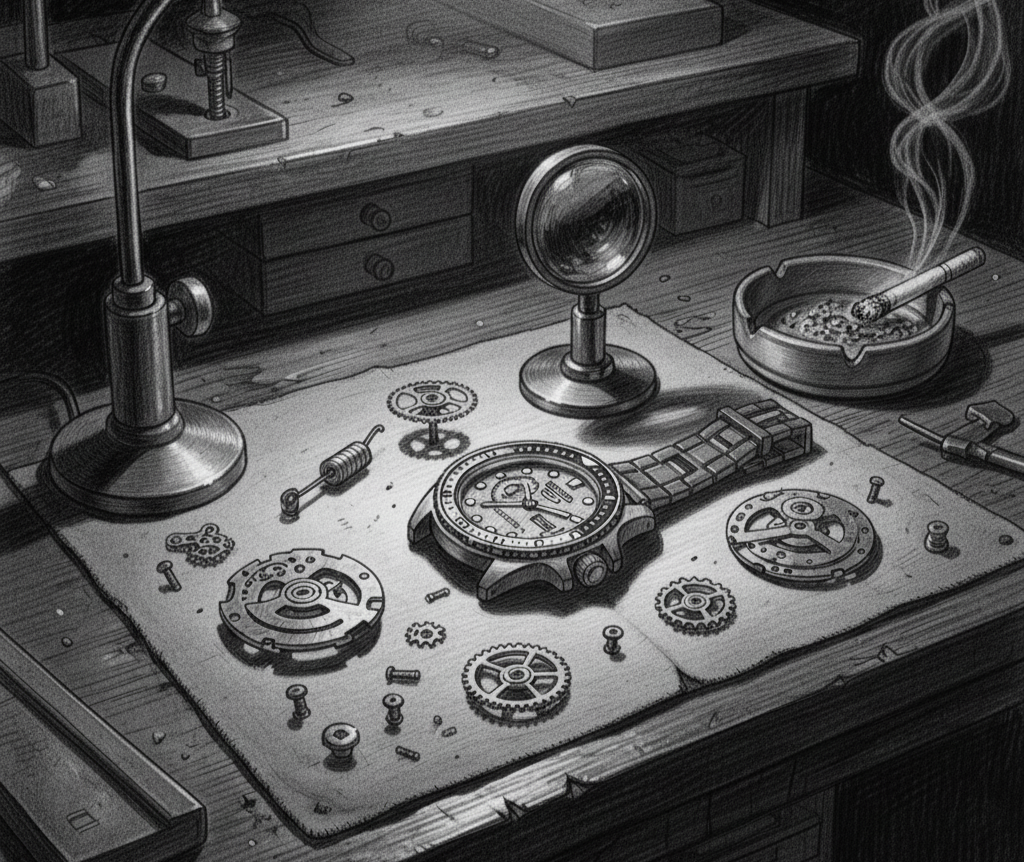
Build Your Ultimate Watch Collection for ₹1K to ₹50K
From Budget to Luxury – What You Need to Own
Knowing what to expect before you hand over your watch can save you money, time, and frustration.

Repairing an older watch in India is both rewarding and challenging. Whether it is a family heirloom, an HMT from the seventies, or a Swiss mechanical, the process demands awareness. Skilled watchmakers still exist across the country, but so do plenty of shops that cut corners.

The first step is to understand what you are handing over.
Type of watch
Quartz watches (battery-operated) are usually cheaper to repair, while automatics and manual winds need more specialised attention.
Brand and age
An HMT or Titan is relatively straightforward to service locally compared to a vintage Omega or Rolex, which may require imported parts and higher expertise.
Movement details
Look for the model number or movement code, usually engraved on the case back or inside. Having this detail helps you verify quotes and avoid vague estimates.
India offers three main options for watch repair.
Authorized Service Centers
These are reliable but often expensive. They typically prefer replacing parts instead of repairing them, which increases the bill. I have made a video about authorized watch service centers in India if you want to explore this further.
Independent Watchmakers
In markets like Zaveri Bazaar in Mumbai, Chandni Chowk in Delhi, Sudder Street in Kolkata, and Indiranagar in Bangalore, you will still find old-school watchmakers who know how to handle vintage and discontinued brands. Their prices are more flexible, and they often attempt genuine repairs instead of outright replacements.
General Electronics or Casual Shops
These should be avoided for valuable watches. A serious watchmaker will have loupes, precision screwdrivers, cleaning solutions, and ideally an ultrasonic cleaning machine. If the shop looks more like a keychain and wall clock stall, it is not the right place to leave your timepiece.
Pricing depends on the brand, condition, and city, but here are realistic ranges based on recent experiences.
Battery change (Quartz)
₹150 to ₹400 in small shops. ₹400 to ₹1,500 in brand stores if seals and water resistance are checked. Luxury brands can cost up to ₹4,000.
Crystal or glass replacement
Acrylic or mineral glass starts at ₹150 to ₹500. Higher quality mineral replacements range from ₹500 to ₹2,000. Sapphire or shaped crystals for luxury watches can reach ₹3,000 to ₹8,000 and more.
Cleaning and oiling a mechanical movement
Ideally, oiling should be done every three to four years as per OEM recommendations. In India, however, most people, including myself, only take the watch in once it has stopped working. For budget watches like HMT, people rarely bother since the watch’s market value is low. Still, if you want to be proactive, basic cleaning and oiling costs ₹500 to ₹1,500 for Indian or Japanese calibres. In better shops, expect ₹1,500 to ₹4,000. Swiss watches usually start at ₹4,000 and can go up to ₹10,000.
Full servicing or overhaul
This is the major category where a watch has stopped working, has rusted parts, or has been lying unused for years. Overhaul usually includes restoration plus oiling. For HMT mechanical watches, the going rate is ₹2,000 to ₹3,000. For older automatic Seikos, it is typically ₹3,000 to ₹6,000 in regular shops. On average, small shops charge ₹2,000 to ₹5,000 for simple watches. Brand service centers or reputable independents usually ask between ₹5,000 and ₹12,000. High-end Swiss overhauls can exceed ₹15,000, especially if rare parts need to be imported.

Plenty of watch owners fall victim to vague promises or inflated quotes. Here is how to protect yourself.
Always ask for a quote up front. A good shop can give you a ballpark estimate once they open the watch.
Request to see old parts after replacement. This ensures honesty and transparency.
Be cautious of sweeping claims like “the whole movement is bad.” Often, only one small component has failed. Always ask what specifically is wrong.
Do not leave original boxes or paperwork unless absolutely required. These are not needed for repairs and can be misused to inflate costs.
Avoid over-polishing. While many shops offer to make your case shine like new, polishing removes metal, softens edges, and reduces originality and collector value.
How long will the repair take? Proper servicing takes days, not minutes.
Are you cleaning and oiling the movement or just fixing one part?
Can I see the replaced parts after the repair?
Do you offer a warranty on the service? Reputable shops usually provide 3 to 6 months.
Why is a second quote important? Because some repairmen may take advantage of your lack of knowledge. They might claim that a mainspring is broken in an automatic or that the entire movement of a quartz watch is damaged, and then try to replace it with a cheap Chinese part while pocketing your original. Others may perform a two-minute fix but charge you for a major overhaul. Established stores rarely do this, but small shops often try. Always get two quotes, compare diagnoses, and then decide.
Treat them as no longer water-resistant unless tested with proper equipment.
Source parts from trusted suppliers. HMT, Seiko, and Citizen spares are often available locally, but Swiss vintage parts usually need to be imported.
Keep originality intact. Avoid dial replacements, hand swaps, or heavy polishing. Originality is key to value.

The safest way to find a skilled hand is through recommendations. Local enthusiast groups, online forums, and collector communities often share reliable names. Look for shops that provide receipts, explain their process, and do not pressure you into unnecessary work.
India still has some of the finest watchmakers capable of reviving your old Titan, HMT, or even a decades-old Swiss classic. But like any skilled trade, you need to know the basics, ask the right questions, and never settle for vague explanations. If a quote feels off, always get a second opinion. Treated wisely, a good repair will add years to your watch’s life without draining your wallet.
Sign up for our exclusive newsletter to know some insider stories!